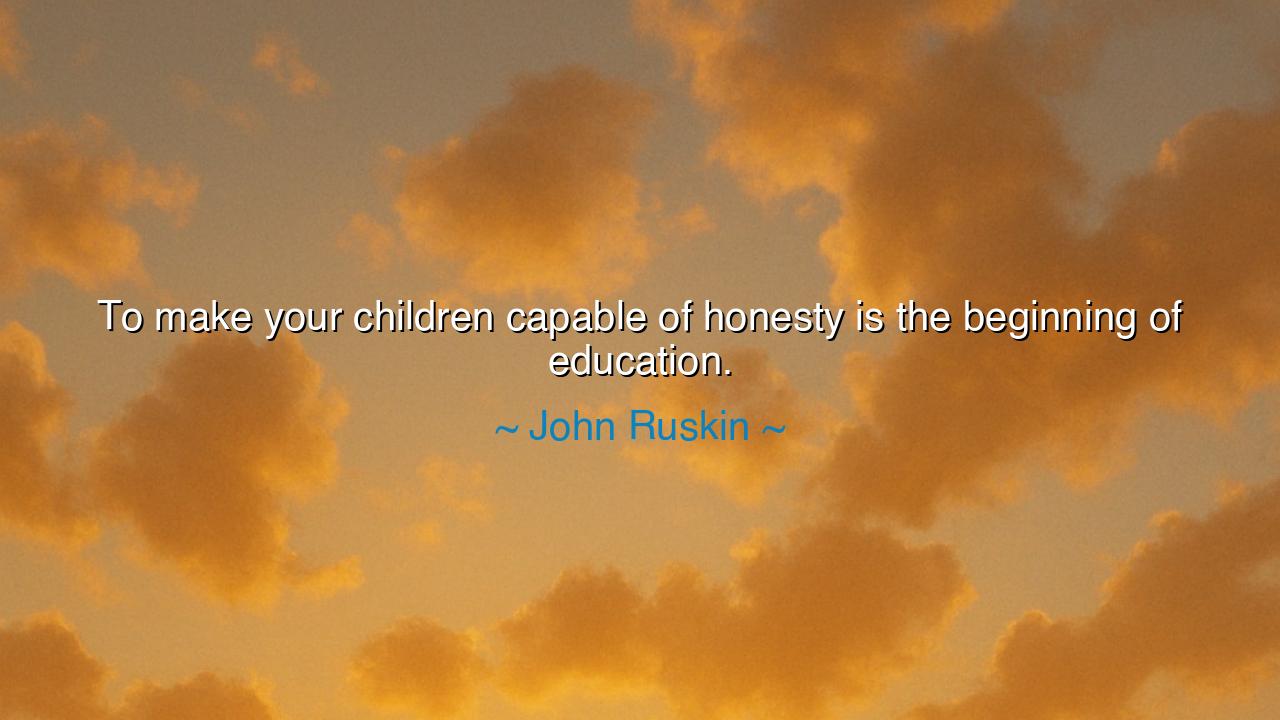
To make your children capable of honesty is the beginning of






The great moral philosopher and artist John Ruskin once declared, “To make your children capable of honesty is the beginning of education.” These words, simple in sound yet profound in depth, strike at the heart of all true learning. For Ruskin understood that education, before it fills the mind, must first shape the soul. Knowledge without virtue is like a sword without a hilt — sharp, powerful, and dangerous to the one who wields it. Thus, he proclaimed that the foundation of all instruction must begin with honesty, the purest reflection of integrity, courage, and truth. It is not enough to make a child clever; one must make the child good.
In the ancient world, the wise knew this truth well. The philosophers of Greece and the sages of the East alike believed that the purpose of education was not the mastery of letters or numbers, but the mastery of self. Socrates, who spent his life questioning men and their morals, taught that the unexamined life is not worth living. To be honest — with oneself and with others — was, to him, the root of wisdom. Likewise, in Confucius’s teachings, virtue stands above skill, and truth above achievement. Ruskin’s words echo their voices through time, reminding humanity that before we teach a child to read or reason, we must teach them to tell the truth, to see clearly, and to stand upright in a world that often bends.
When Ruskin speaks of making children “capable of honesty,” he does not mean merely avoiding lies. He means the shaping of a spirit that loves truth — a heart that would rather suffer than deceive. True honesty is not a matter of speech, but of being. It is courage in the face of temptation, humility in the face of pride, and clarity in the face of confusion. To make a child capable of such honesty is to build within them the foundation upon which all other virtues rest. Without it, intelligence becomes cunning, ambition becomes greed, and knowledge becomes corruption. But with it, even a modest soul becomes noble.
Consider the story of George Washington, the first President of the United States. Legend tells of the day young Washington confessed to cutting down his father’s cherry tree, declaring, “I cannot tell a lie.” Whether myth or memory, the story endures not because of its literal truth, but because it captures the essence of education through virtue. That single act of honesty, small as it seems, reveals a greatness that would later guide a nation. It teaches that true leadership, true wisdom, and true dignity all begin with the courage to be honest, even when falsehood seems easier.
Ruskin, living in the Victorian era, saw a society that prized progress, machinery, and wealth above moral clarity. He warned that a civilization that forgets the teaching of virtue will one day find its brilliance hollow. His call was not for more schools or books alone, but for education of the heart — for the formation of character. To him, honesty was the first and highest art of the human soul, the quality that binds all others together. Just as an architect cannot build a temple upon sand, so too can no teacher build wisdom upon deceit.
In every age, this lesson remains urgent. We live in a time when knowledge multiplies, but truth is often blurred; when children learn to navigate devices before they learn to navigate conscience. Ruskin’s words strike like a bell through the fog: to make our children capable of honesty is the first and greatest duty of parents, teachers, and nations. For a society that fails to teach truth will soon drown in its own cleverness.
Let every home, then, be the first school of honesty. Let parents reward truth more than triumph, sincerity more than success. Let teachers praise not only high marks, but upright hearts. Let every act of education aim not just to sharpen the intellect, but to cleanse the conscience. For to raise a generation of truthful souls is to ensure the survival of light in a darkening world.
And so, as John Ruskin reminds us, education begins not with words, but with example; not with lessons, but with integrity. To teach a child to love truth above comfort is to awaken the divine within them. From that seed of honesty, all wisdom grows. And when a people live by truth — unyielding, fearless, pure — they build a civilization that no lie can ever destroy.






AAdministratorAdministrator
Welcome, honored guests. Please leave a comment, we will respond soon